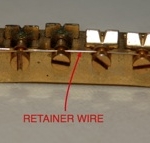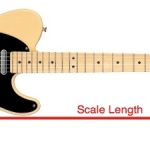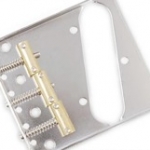Articles tagged with: bridge
Featured, How To, Workshop »

Buzz is the bane of the guitarist. Fret-buzz is the one that gets all the press and, to be sure, it’s a serious pain. Frets are not the only thing that is likely to buzz, rattle and hum on your guitar though. If you’ve got a Gibson (or Gibsonesque – the one below is a Gretsch) guitar it’s possible that your Tune-O-Matic bridge may be the cause of that buzz you hear.
If you can hear a metallic rattle or buzz when you pick a note – sometimes all notes, sometimes …
Guitar 101, Headline »

Today, in Guitar 101, we’re looking at the guitar neck. And, this time, we’re taking considering scale length and string compensation.
Scale length
Scale length is, effectively, the ‘sounding’ length of the string – i.e. the bit that actually ‘sounds’ (or vibrates – it’s the same thing) when plucked. This means that we’re only considering the length of string between the nut and saddle (see our article on Guitar Anatomy if you need a refresher on these terms).
Some of the common scale lengths of popular guitars and basses are:
Many Gibson Guitars, Les Paul, SG, …
Read the full story »Headline, How To, Workshop »

The 3-Saddle Intonation Problem
If you play a Telecaster with a 3-saddle bridge (like the one shown opposite), you may be aware that setting intonation on the instrument is a matter of compromise. Because a single adjustment screw sets the intonation on two different strings at the same time, Telecaster intonation is really a matter of ‘balancing the differences’ and getting each string as close as possible without putting its partner string out by too much.
Move to a 6-saddle bridge
If this really bothers you, you can move to a 6-saddle bridge. …

